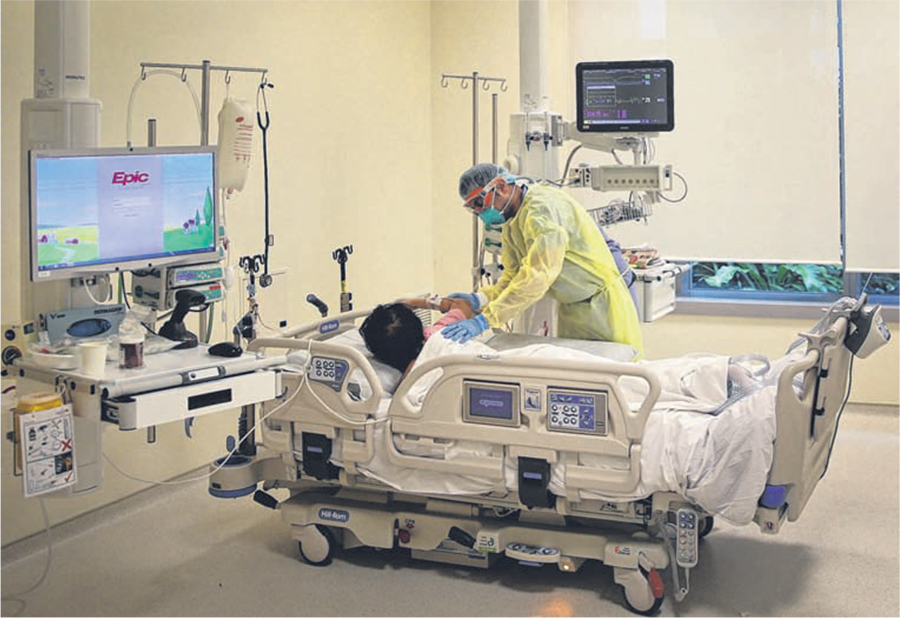 Dr Nikhil Gautam, a resident physician at Ng Teng Fong General Hospital, helping a Covid19 patient into the prone position in the intensive care unit’s isolation room on Tuesday. ST PHOTO: KEVIN LIM
Dr Nikhil Gautam, a resident physician at Ng Teng Fong General Hospital, helping a Covid19 patient into the prone position in the intensive care unit’s isolation room on Tuesday. ST PHOTO: KEVIN LIM
The Straits Times (23 April 2020)
Patients lying face down on their stomachs in hospital beds have needed less oxygen support than those lying on their backs.
The discovery has prompted some healthcare institutions here, including the National Centre for Infectious Diseases (NCID), to place more of their patients in the prone position.
Respiratory and critical care medicine consultant Puah Ser Hon declined to provide specific numbers when speaking to The Straits Times on Thursday, but said that "significantly more" Covid19 patients at the centre are now lying on their stomachs.
Dr Puah, who is with Tan Tock Seng Hospital, looks after patients in NCID’s intensive care unit (ICU).
The facility, which was built to strengthen Singapore’s capabilities in infectious diseases management and prevention, has had more than over 1,900 Covid19 patients since the disease began spreading here on Jan 23.
Dr Puah said the NCID made the move after increasing anecdotal evidence showed that putting Covid19 patients in the prone position helps improve their oxygen flow.
"We are seeing quite a remarkable change in their oxygen levels. When they are lying down on their backs, the very severe and sick cases require quite (a lot of) oxygen support.
"But when we put them in the prone position, (these) requirements do come down," he explained.
Pneumonia caused by Covid19 often results in damage to patches of the patients’ lungs, while other parts of the lungs remain in good condition.
Dr Puah said pus and other fluids may build up in the damaged areas and, as people naturally tend to lie on their backs when they are resting, the back of such patients’ lungs tends to get inflamed.
This makes it difficult for oxygen to be exchanged there, and results in breathlessness and other complications.
However, when patients are in the prone position, blood is naturally redistributed because of gravity, allowing it to reach the parts of the lungs that are still in good condition.
The body can then process the oxygen that the blood carries.
Dr Puah said international trials have shown that it is beneficial to put Covid19 patients in the prone position for about 16 hours a day, before turning them over to rest on their backs.
This is because lying on one’s stomach puts pressure on other body parts, and cannot be done for too long.
He added that there is a lot of ongoing research on the benefits of putting patients in the prone position, and that more time is needed to tell whether it will aid in the overall recovery of Covid19 patients.
One immediate benefit remains clear – it helps such patients feel less breathless and reduces the amount of oxygen support they need.
Dr Puah said that the prone position is also being tried out on non ICU patients in NCID.
However, he cautioned that this should not be taken as a blanket recommendation for all sick people to lie on their stomachs, and that the position is suitable only for patients who meet certain criteria.
This would include those whose bodies have trouble processing oxygen, and who do not have heart, back, spinal or blood pressure issues. It also does not have any implications on the sleeping position of healthy people.
"It is best to leave it up to health professionals to decide when it is needed, when one is unwell," he said.
Deep breathing, stretching exercises not prescribed for Covid19 patients
Videos have been circulating online extolling the benefits of deep breathing and stretching exercises in fighting the coronavirus infection.
But respiratory and critical care medicine consultant Puah Ser Hon, who looks after patients at the National Centre for Infectious Diseases’ intensive care unit, said his team does not tailor such exercises for Covid19 patients.
One video shows a doctor telling patients to take five deep breaths, holding their breath for five seconds each time.
They are then told to take a sixth deep breath and cough, before repeating the entire process.
Patients are then advised to lie on the bed and take slightly deeper breaths for the next 10 minutes.
About the only advice from the various videos that has some support from experts is the point about staying active.
Dr Puah noted that remaining active – while not overstraining oneself – is important in beating any disease, as long periods of being bedbound can weaken the muscles in a person’s body.
He said: "If you were a marathon runner who ran a couple of marathons, then you fell sick and decided not to run marathons for two years, you would find yourself unable to hit that pace again.
"Similarly, if... all you do is lie in bed for the next two weeks to four weeks, all your muscles will definitely become (weaker). This is especially so for older folk, who will probably need a lot more physical therapy and rehabilitation to get them back to their original physical state."
He added: "We are not asking you to go and do high intensity interval training when you are sick, but just don’t be too bedbound."